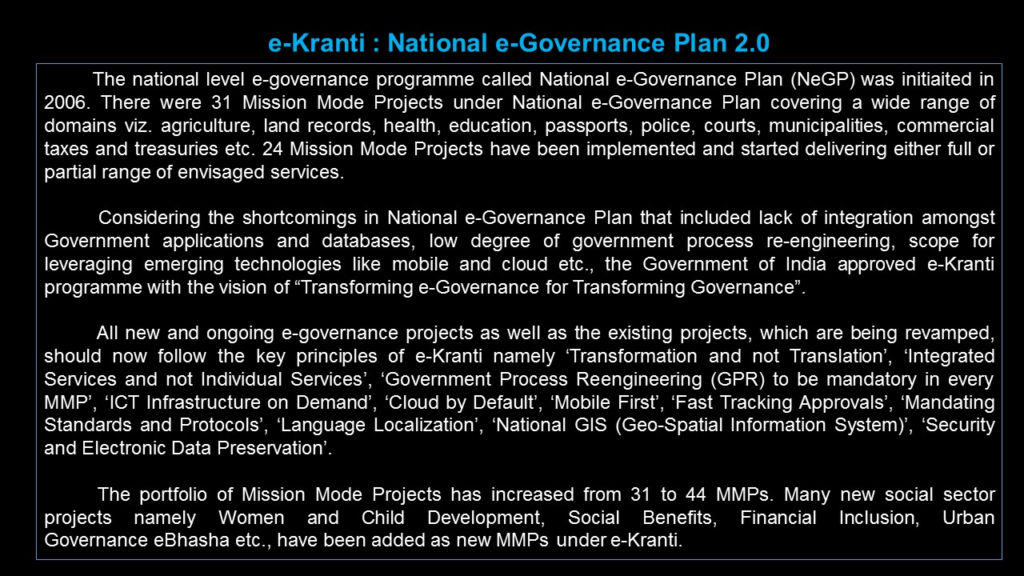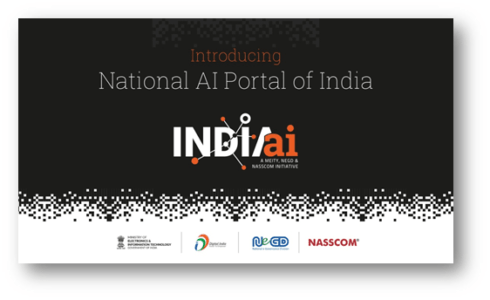National AI Portal- INDIAai
Context:
The ‘National AI Portal’, celebrated its first anniversary on 28th May, 2021.
About National AI Portal- INDIAai:
- INDIAai (The National AI Portal of India), a joint venture by Ministry of Electronics and Information Technology (MeitY), National e-Governance Division (NeGD) and National Association of Software and Service Companies (NASSCOM), has been set up to prepare the nation for an AI future. It is the single central knowledge hub on artificial intelligence and allied fields for aspiring entrepreneurs, students, professionals, academics, and everyone else.
- The portal focuses on creating and nurturing a unified AI ecosystem for driving excellence and leadership in India’s AI journey, to foster economic growth and improve lives through it.
- NeGD: In 2009, NeGD was created as an Independent Business Division under the Digital India Corporation (a not-for-profit company set up by MeitY).
- NASSCOM: A not-for-profit industry association, is the apex body for the IT and IT enabled products and services sector in India.
About Artificial Intelligence (AI):
- Artificial intelligence (AI) is the simulation of human intelligence processes by machines, especially computer systems. Specific applications of AI include expert systems, natural language processing (NLP), speech recognition and machine vision.
- AI programming focuses on three cognitive skills: learning, reasoning and self-correction.
- Learning processes. This aspect of AI programming focuses on acquiring data and creating rules for how to turn the data into actionable information. The rules, which are called algorithms, provide computing devices with step-by-step instructions for how to complete a specific task.
- Reasoning processes. This aspect of AI programming focuses on choosing the right algorithm to reach a desired outcome.
- Self-correction processes. This aspect of AI programming is designed to continually fine-tune algorithms and ensure they provide the most accurate results possible.
Initiatives Taken to Boost Use of AI
- The National Strategy for Artificial Intelligence (NITI Aayog, June 2018) which is focused on inclusive AI (AI for all), and the New Education Policy (NEP, 2020) which addresses the need to inculcate AI in the curriculum are the right strategic steps to encourage core and applied research.
- The Ministry of Tribal Affairs (MTA) has inked a MoU with Microsoft to support the digital transformation of schools such as Eklavya Model Residential Schools (EMRS) and Ashram Schools, among others under the Ministry.
- US India Artificial Intelligence (USIAI) initiative has been launched to scale up the science and technology relationship between India and the United States.
- In 2020, India joined the ‘Global Partnership on Artificial Intelligence (GPAI)’ as a founding member to support the responsible and human-centric development and use of AI.
- ‘RAISE 2020 – Responsible AI for Social Empowerment 2020’, a mega virtual summit, was jointly organised by the NITI Aayog and the MeitY.
- The larger aim of the program “Responsible AI for Youth” is to provide an equal opportunity to all Indian youths – in urban, rural and remote corners of India – to become human-centric designers who can create real AI solutions to solve economic and social impact issues of India.
Challenges with AI in India
- Absence of collaborative effort between various stakeholders
- Concerns on privacy and security of data, including a lack of formal regulation around anonymization of data.
- Lack of sufficient talent to build and deploy AI systems at scale. An estimate claims that only 4% of AI professionals in India have worked on emerging technologies such as deep learning and neural networks. There is also a significant gap in Ph.D. research scholars in the field.
- Difficulty in access to industry-specific data required to build customized platforms and solutions is now currently in the hands of a few major players. It is challenging for new beginners to provide customized services that can compete with the existing data that includes rich incumbents such as Facebook or Google. This phenomenon results in the creation of a virtuous cycle which reinforces the hegemony of the big few, creating a huge entry barrier for start-ups.
- High cost and low availability of computing infrastructure required for development, training, and deployment of AI-based services. Cloud infrastructure, though growing rapidly, has limited capability.
- Lack of infrastructure is the major reason for many Indian AI start-ups that aims to incorporate their business outside the country, thus, making AI outside the reach of Indian researchers in government labs and many industries. Initiatives like GI Cloud (MeghRaj), are in the right direction.
- Lack of AI awareness in resolving business-related issues in most of the public enterprises and government agencies has led to the scarcity of AI professionals in obstructing adoption.
Way Forward to Harness the Power of AI
- Instigating Core and Applied Research in AI: Advanced research, both core and applied, provides the basis for commercialization and utilization of any emerging technology, more so for technologies like AI. A considerable amount of dedication and effort is required to build comprehensive research focusing on AI strategy for India.
- Getting India Ready for the AI Wave: India may appear to be relatively well-positioned to take advantage of the disruption in the AI system through its advanced IT sector and large youth demographic potential to establish itself as the future hub for AI-related activities. However, given the reduced availability of qualified faculty and researchers, this advantage could quickly change into a liability without urgent government interventions towards promoting access to such skills. This is a critical component of AI development and should be a national priority.
- Accelerating Adoption: Adoption of AI in India has been slow and remains limited. Estimates indicate that only 22% of the firms in India use AI in any business process. Government intervention is needed to promote AI adoption, lest India loses the chance to secure a prominent position on the global AI map. While acknowledging the need to improve AI, governments at different levels, along with their various instrumentalities, should adopt proactive measures to accelerate AI adoption in multiple processes.
- Ethics, Privacy, Security, and Artificial Intelligence: AI is going to be the tipping point in the technological evolution of mankind, with human dependence on machines and algorithms for decision making never been such profound. Thus, any strategy document on promoting AI necessarily needs to be conscious of the probable factors of the AI ecosystem that may undermine ethical conduct, impinge on one’s privacy, and undermine the security protocol. Appropriate steps to mitigate these risks need to be an integral part of any such strategy. For e.g., National Cyber Security Policy (NCSP – 2013) talks about the Sensitization of citizens, consumers, and employees on cybersecurity threats and basic and best practices Sensitization towards the safety of cyber threats and in pursuance of security programs.
These challenges, if addressed by relevant stakeholders, with the government playing a leading role could lead to fundamental building blocks that form the core to India’s march towards leadership in AI in an expeditious manner through concerted and collaborative efforts.

Source: PIB
Error: View 2abe19astg may not exist



